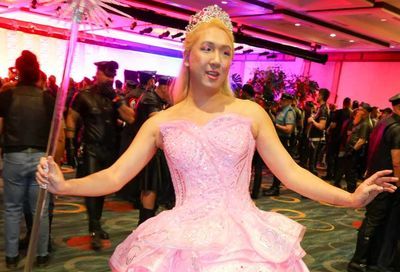U.S. Halts LGBTQ Discrimination Complaint Processing
The EEOC has ordered its employees to deprioritize sex-based discrimination complaints from LGBTQ individuals.

The U.S. Equal Employment Opportunity Commission (EEOC) has ordered employees to stop processing claims from LGBTQ individuals alleging violations of their rights under Title VII of the Civil Rights Act, which prohibits discrimination on the basis of “sex.”
In a 2020 court case, the U.S. Supreme Court found that the federal civil rights law’s protections extend to instances where employees have been fired or denied promotions due to their sexual orientation or gender identity.
The finding in that case runs counter to the Trump administration’s recent executive orders refusing to recognize gender identity as valid and recognizing “sex” as fixed and congruent with one’s assigned sex at birth.
It is unclear when, if ever, the EEOC will resume processing complaints from LGBTQ people alleging sex-based discrimination under Title VII. Two individuals with knowledge of the situation told HR Dive that additional guidance will be forthcoming.
However, the EEOC told HR Dive that it is still accepting complaints and does not reject charges of discrimination.
Andrea Lucas, a Republican who is Acting Chair of the EEOC, recently announced that the agency would roll back several Biden administration policies that sought to extend protections to LGBTQ people and inform them of their rights under Title VII.
Citing President Trump’s executive order, Lucas announced her intention to refocus the agency’s purpose around “protecting women from sexual harassment and sex-based discrimination in the workplace by rolling back the Biden administration’s gender identity agenda.”
Lucas said she would prioritize defending “the biological and binary reality of sex and related rights,” remove the EEOC’s “pronoun app,” remove “X” and “Mx.” gender markers from agency forms, and remove materials “promoting gender ideology” from the agency’s website.
Legal experts say that while the removal of gender identity and sexual orientation references from the EEOC website may indicate that the administration is deprioritizing complaints of LGBTQ discrimination, the Supreme Court’s ruling remains binding.
So, even if the agency deprioritizes processing complaints, there are other ways that workers could pursue legal action against discriminatory employers in court.
Additionally, many states have their own laws prohibiting employment-based discrimination, meaning workers could sue under those statutes.
“Even if the [EEOC] shifts its focus, employers must still comply with federal protections against LGBTQ+ discrimination,” Louise Ryder, a senior employment law attorney at The Spiggle Law Firm, told Forbes magazine.
Support Metro Weekly’s Journalism
These are challenging times for news organizations. And yet it’s crucial we stay active and provide vital resources and information to both our local readers and the world. So won’t you please take a moment and consider supporting Metro Weekly with a membership? For as little as $5 a month, you can help ensure Metro Weekly magazine and MetroWeekly.com remain free, viable resources as we provide the best, most diverse, culturally-resonant LGBTQ coverage in both the D.C. region and around the world. Memberships come with exclusive perks and discounts, your own personal digital delivery of each week’s magazine (and an archive), access to our Member's Lounge when it launches this fall, and exclusive members-only items like Metro Weekly Membership Mugs and Tote Bags! Check out all our membership levels here and please join us today!
























You must be logged in to post a comment.